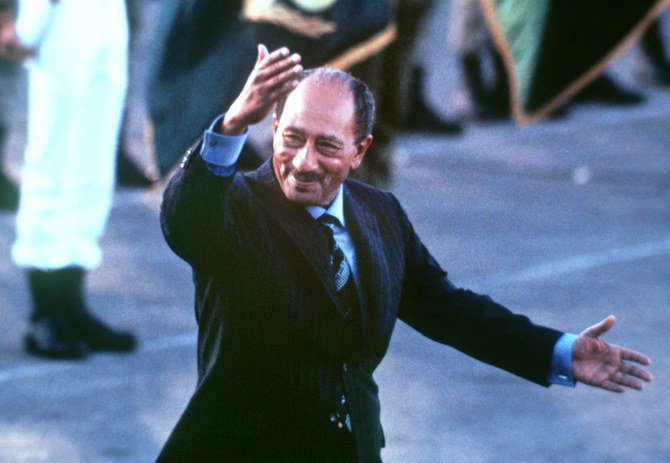- ARAB NEWS
- 02 Jul 2025

Hani Hazaimeh
As the first Arab leader to visit, the Egyptian president made a bid for peace that outraged the region
Summary:
On Nov. 19, 1977, Egyptian President Anwar Sadat became the first Arab leader to visit Israel, in a bid to bring about a lasting peace between two countries locked in conflict since the foundation of Israel 30 years earlier.
Only four years earlier, Sadat had ordered Egyptian troops into the Sinai Peninsula, triggering an Arab-Israeli war. But on Nov. 20, he and Israeli Prime Minister Menachem Begin spoke at a joint press conference in Jerusalem, announcing an end to hostilities between their nations and pledging to work toward peace in the Middle East.
The meeting was a stepping stone to the Camp David Accords in September 1978, which led to the signing of the Egypt-Israel Peace Treaty in Washington in March 1979. In October 1978, Sadat and Begin were awarded the Nobel Peace Prize.
But as Arab News reported on Nov. 22, 1977, the peace initiative angered many Arabs, who saw it as a betrayal of the Palestinians. Egypt was ejected from the Arab League, and during a military parade in Cairo in October 1981, Sadat was assassinated by extremists opposed to the treaty.
JEDDAH: It was 1979 when I first heard of Egyptian President Anwar Sadat, and unfortunately it was not a pleasant occasion. That was when he decided to make peace with an enemy state of the Arabs, and took the initiative solely to sit down with Israeli leaders and sign a peace treaty, later known as the Camp David Accords.
At the time, there was an Egyptian man working at a bakery in our neighborhood in Zarqa, Jordan. Of course for a 13-year-old boy, a peace treaty was meaningless as I had no idea what that meant and had no interest in politics. All I knew was that the people in our neighborhood started yelling and screaming in the streets: “Sadat is a traitor.”
Following the steps of my elders, I ran to the Egyptian baker and shouted in his face “Sadat is a traitor,” without even knowing what that word meant. But as I grew older I became more aware, especially because my country, Jordan, is directly involved in the Arab-Israeli struggle and the Palestinian cause, and because the repercussions of the Israeli occupation of Palestine were immensely devastating not only to Jordan but to the whole region.
After Sadat announces his intention to visit Israel, Israeli prime minister Menachem Begin addresses the Egyptian people from Jerusalem, pleading for “no more wars, no more bloodshed.”

Sadat becomes the first Arab leader to visit Israel, addressing the Israeli parliament the next day. “Before us today,” he says, “lies the … chance for peace … a chance that, if lost or wasted, the plotter against it will bear the curse of humanity and the curse of history.”

At the invitation of US president Jimmy Carter, Sadat and Begin arrive at Camp David for 10 days of talks.

Begin and Sadat sign the framework for peace at the White House in Washington.

Sadat and Begin are jointly awarded the Nobel Peace Prize.

Sadat and Begin sign the Egypt-Israel Peace Treaty in Washington.

Anwar Sadat is assassinated in Cairo by Islamic extremists opposed to the peace treaty.
I read so many articles about Sadat’s legacy in order to understand what informed his ideology. He remains a controversial figure in the Middle East. Praised as a prophet and cursed as a traitor, neither his death in 1981 nor the passage of time have resolved the ongoing debate about the man and his legacy.

“Egypt and Israel, which battled four times in three decades, made a mutual unwritten pledge Monday to end their state of war in an unprecedented agreement aimed at achieving a negotiated peace settlement. Egyptian President Anwar Sadat and Prime Minister Menahem Begin made the declarations separately in the climax of a historic first visit to Israel by an Arab leader that spurred hope for an Arab-Israeli peace.”
From a wire story on Arab News’ front page, Nov. 22, 1977
Some of the controversy over Sadat arises from an even bolder move, when Egyptian troops broke through the Bar Lev Line — a chain of fortifications built by Israel along the eastern bank of the Suez Canal after it seized Egypt’s Sinai Peninsula during the 1967 Arab-Israeli war — on Oct. 6, 1973.
The dramatic crossing electrified a country demoralized by its defeat in the 1967 war. Although Egyptian troops fared less well once the element of surprise had passed and the war raged on for several weeks, even temporary success against a country that had been Egypt’s foe for 25 years allowed Sadat to consolidate his leadership domestically.
He was being seen as a brilliant strategist, since his limited war against the Israelis resulted in the Egyptians regaining control over the Suez Canal, in what the Egyptian military to this day considers its principal victory in the modern era.
Sadat’s emergence on the world stage, however, remained tied to his political success in Egypt. He dismantled many of the socialist features of the Egyptian state, and in so doing he impressed Western leaders with his sincerity, weakened his opponents and enriched his friends. Several times during US-mediated peace negotiations with Israel, Sadat slipped a secret copy of his “fall back” positions to the US president.
Sadat also applied his mastery of symbolism to international relations. His decision to go to Jerusalem was breath-taking in its effect, and his landing on Israeli soil on Nov. 19, 1977, irrevocably changed the nature of the Arab-Israeli conflict. In one gesture granting the Israelis the recognition they had been demanding for decades, Sadat at the same time won an American commitment to aid Egypt in recovering the lands it had lost in war.
Although he will always be remembered for his courageous leap toward peace, Sadat’s ultimate legacy remains uncertain. The negotiations he started did not result in the end of the Arab-Israeli conflict, nor did they create a prosperous Egypt.
Hani Hazaimeh
Sadat’s unilateral decision to go to Jerusalem and address the Israeli Parliament was surely the most dramatic of his life. It was an absolute defiance of two widely accepted principles of inter-Arab diplomacy. The first was that no direct negotiations with Israel should take place as long as the latter continued to occupy Arab lands. The second was that if any negotiations did take place, the Arabs should conduct them collectively rather than individually.
Sadat was the first Arab leader to break these rules, and by doing so he triggered anger not only among Arab leaders but also among the public, who took to the streets in masses, accusing him of betraying the Arab consensus. His decision was dramatic not only because it utterly transformed the Middle East, but also because it was a supreme act of faith.
He decided to play his primary card — recognition of Israel — out of a conviction that the US, and particularly President Jimmy Carter, would not allow his effort to be in vain. The gesture becomes even more impressive when one considers that the great trust that Sadat and Carter had in each other had developed after only a single set of meetings between them.

Although he will always be remembered for his courageous leap toward peace, Sadat’s ultimate legacy remains uncertain. The negotiations he started did not result in the end of the Arab-Israeli conflict, nor did they create a prosperous Egypt.
But it is worth remembering that Sadat’s political skill brought enormous benefit to his country. Egypt now has peace on its eastern border, and faces no serious military threats from any direction. It has received tens of billions of dollars in US aid over the last two decades, which it has used to modernize its army and thoroughly improve its national infrastructure.
Even small Egyptian villages are now connected to the electric grid, and in the country, credit for that is seen to lie with Sadat rather than the US. Egypt also has emerged as the leading state in the Arab world and the region.
Faced with a crumbling and inward-looking economy oriented toward the Soviet Union, Sadat laid the groundwork for Egyptian prosperity, even if it has not yet arrived. He truly led his country, and it was his tragedy that, perhaps, he got too far ahead of the people he was leading.